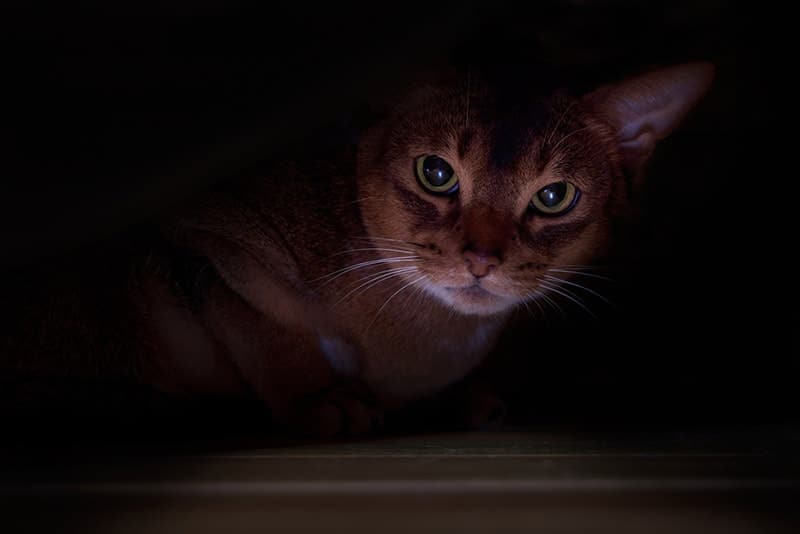Cats love to hide behind furniture, in boxes, and under just about any object they can fit beneath. They’re so stealthy you may find yourself shaking a bag of treats just to ensure they’re still in your house! But have you ever wondered why your feline companion often puts themselves in small, dark spots?
Worry not, cat fans—hiding in dark places is normal behavior! There are many interesting reasons why your cat is a hide-and-seek champion, so read on to learn more.

The 5 Reasons Why Cats Like to Hide in Dark Places
1. Your Cat’s Natural Instincts
Cats are natural hunters, and any good hunter knows the appeal of the element of surprise! Your kitty finds these spots to be excellent vantage points to stalk their prey from, and it all dates back to their ancestors’ wild escapades in the forests hunting mice, voles, and other small critters. Your cat, however, might be stalking a toy on the floor, a dust bunny, or your toes.
If your cat seems to be darting in and out of hiding places, this is probably what’s going on. Of course, some cats just like to hide and pretend to stalk their prey. Sometimes, hiding is just as fun as catching. Therefore, don’t be surprised if your cat just hides and stares out with big, dilated eyes.
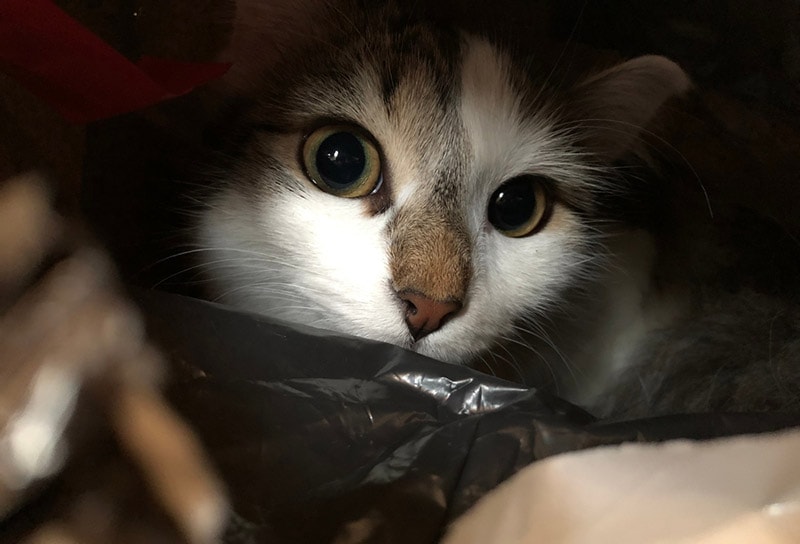
2. Light Sensitivity
Did you know cats have a completely different view of the world than humans? A cat’s eye perceives light much differently than ours. A cat’s retina has more rod receptors (they’re sensitive to light, movement, and shape) than cone receptors (sensitive to color). This means that their eyes take in much more light than ours, meaning our artificial lightbulbs might sometimes be a little much for them. The reprieve from the light in their little hiding spot might be just what they need to give their eyes a rest. In exchange, though, they see fairly well in the dark!
Cats may hide in dark places when trying to sleep. Just like you, cats prefer to sleep when it is dark, even though they often sleep during the day. Cats often like to feel cozy when they’re napping, too. For a cat, that means finding an enclosed, comfortable space to hide in.
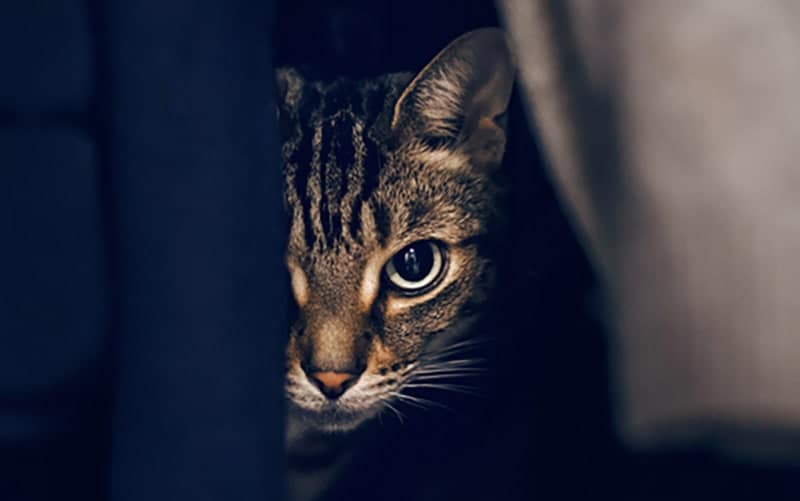
3. You Can’t Disturb What You Can’t Find
Do you like waking up every 5 minutes while trying to nap? No? Well, neither does your cat. Cats love to take naps during the day, but very little is deep sleep; most is just dozing, which is very light. Every time something disturbs your cat during the day, they wake up to respond, just like they would in the wild—and many false alarms could be annoying, you know? To get around this, your cat might nap somewhere warm and dark where they’re less likely to be bothered.
Cats often find sleeping places that are out of the way, and you can’t get more out of the way than underneath a bed. This behavior isn’t a sign that they don’t like you (or anyone else). Sometimes, cats just want to sleep.
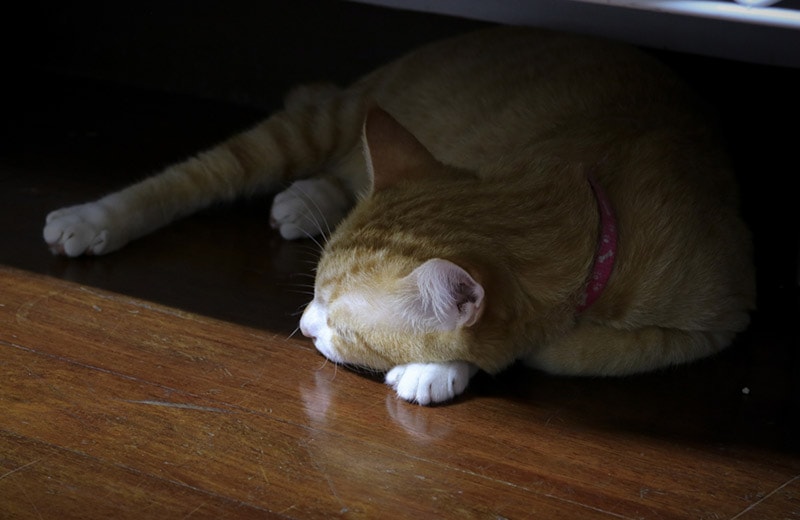
4. Their Internal Clock
Cats are crepuscular creatures. This means they’re generally most active in the evening and early morning; in the wild, this is when they would hunt. The lower light levels in their hiding places may trick their internal clock and give them more energy than in the lighter parts of your home. When a cat has already slept for much of the day, they may slink away to the low-light areas to play. Artificial lights can mess with a cat’s internal clock, and some may seek to remedy this by avoiding the lights altogether.
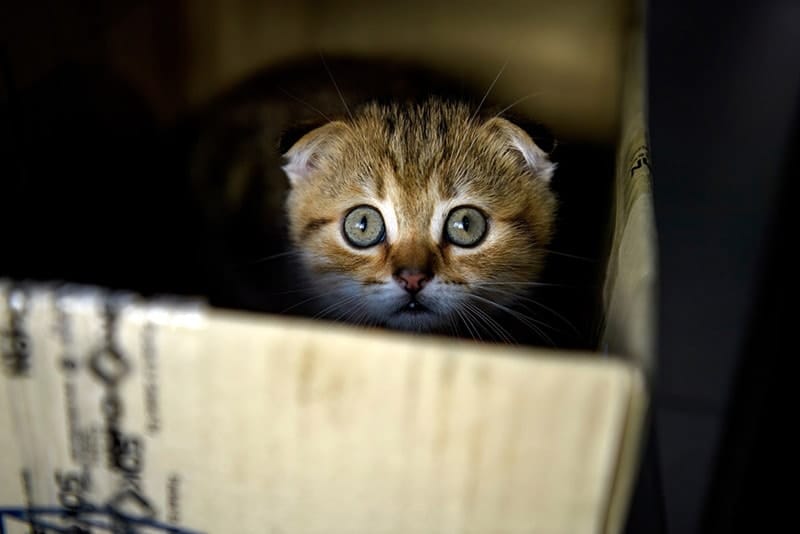
5. Safety is Key
Many animal behaviors revolve around safety, and this one is no exception. Cats don’t only hide to get the jump on prey or avoid being disturbed—they may also hide to avoid their own predators. Cats are often hunted by wolves, foxes, large birds of prey (think hawks or owls), and even other cats! Hiding from those predators is an important survival instinct in and of itself. Many cats enjoy the very act of hiding. It’s a type of play for cats, just like humans may sit somewhere cozy with a cup of coffee. It’s enjoyable, and cats often don’t need a reason beyond that.
When stressed, cats may hide more than usual. Often, this is because their body is in “danger” mode, and one way they try to stay safe is by hiding. Cats that are sick will do the same thing for the same reason. if a cat is sick, they are more prone to falling victim to another predator. Therefore, staying hidden is one of the few ways they can combat this.
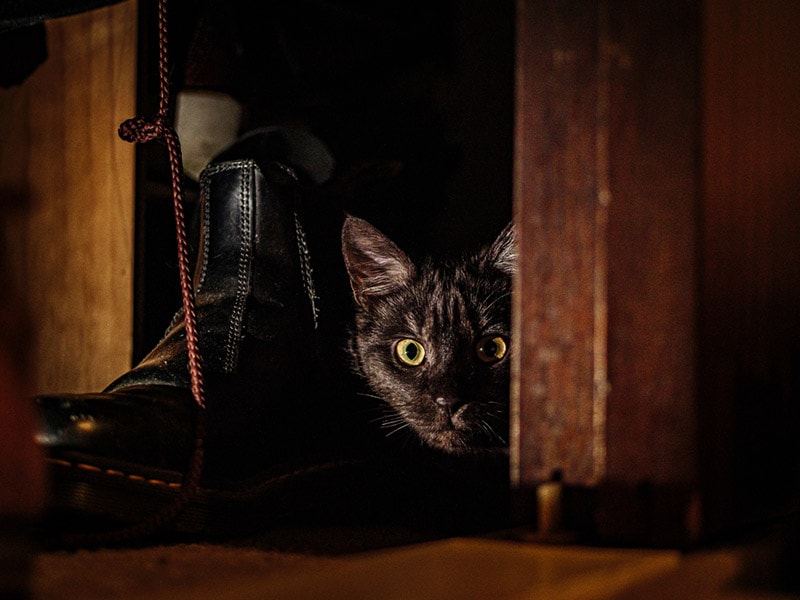

Conclusion
Cats are interesting and complicated creatures. While you may find it strange that your cat is often nowhere to be seen, hiding in dark spots is crucial to their well-being. There isn’t a reason to worry if your cat is hiding away in dark places. Often, cat’s just like to hide! It’s a natural behavior that most cats exhibit at least some of the time. You should only get worried if your cat seems to be excessively hiding, as this may be a sign of an underlying illness.
Cats often hide when they are sick, though that doesn’t particularly mean that they’ll hide in dark places. Ask your vet if you think your cat may be hiding a bit too excessively.
You might also like:
Featured Image Credit: Konstantin Zaykov, Shutterstock

